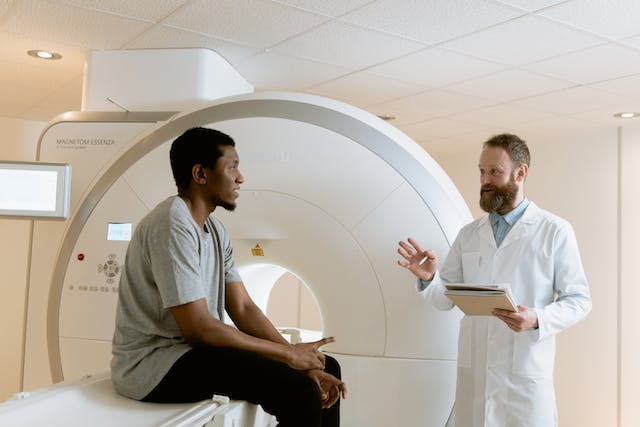Hip pain can significantly impact your quality of life, affecting your mobility, sleep, and overall well-being. While many hip issues can be managed with conservative treatments, there comes a point for some individuals when a hip replacement becomes the most viable option for relief. Understanding the signs that indicate a potential need for a hip replacement can empower individuals to seek timely medical intervention. Here are five signs that suggest you might need a hip replacement:
1. Persistent Pain:
One of the primary indicators that you might need a hip replacement is persistent hip pain that doesn’t improve with conservative treatments. This pain can manifest in various forms, including a dull ache, a sharp stabbing sensation, or a constant discomfort that worsens with movement. Initially, you might notice pain during certain activities like walking, climbing stairs, or getting up from a seated position. Over time, the pain may become more constant, interfering with your ability to perform everyday tasks and impacting your quality of life. It’s essential to pay attention to the location of the pain. Pain originating from the hip joint is typically felt in the groin area, buttocks, thigh, or even the knee. If you experience persistent hip pain that limits your mobility and doesn’t respond to rest, medications, physical therapy, or other non-invasive treatments, it may be a sign that the joint damage is severe enough to warrant a hip replacement.
2. Stiffness and Limited Range of Motion:
Another sign that you might need a hip replacement is stiffness and a limited range of motion in your hip joint. As the hip joint deteriorates due to conditions like osteoarthritis, rheumatoid arthritis, or avascular necrosis, the joint’s ability to move smoothly is compromised. You may notice increasing difficulty in performing simple tasks such as bending down to tie your shoes, putting on socks, or getting in and out of a car. This stiffness and restricted movement can progressively worsen, making it challenging to participate in activities you once enjoyed. You may find it increasingly difficult to engage in exercise, recreational sports, or even basic movements like walking or standing for prolonged periods. If conservative measures fail to alleviate stiffness and improve your hip’s range of motion, it may be an indication that a hip replacement is necessary to restore function and mobility.
3. Chronic Inflammation and Swelling:
Chronic inflammation and swelling around the hip joint are common symptoms of underlying hip conditions that may require surgical intervention. Inflammation occurs as the body’s response to joint damage and can contribute to pain, stiffness, and reduced mobility. You may notice swelling in the hip area, which can be accompanied by warmth, redness, and tenderness to the touch. While inflammation and swelling can be managed with anti-inflammatory medications, corticosteroid injections, or physical therapy in the early stages, persistent swelling, despite treatment, may indicate advanced joint deterioration. If conservative measures fail to alleviate inflammation and swelling, it’s essential to consult with a healthcare professional to explore the possibility of a hip replacement.
4. Difficulty Performing Daily Activities:
As hip pain and dysfunction progress, you may find it increasingly challenging to perform daily activities that once seemed effortless. Simple tasks like walking the dog, doing household chores, or even getting dressed may become daunting and painful. The pain and limitations imposed by hip issues can significantly impact your independence and overall quality of life, leading to frustration and a sense of helplessness. If you find yourself avoiding certain activities or modifying your lifestyle to accommodate hip pain and dysfunction, it may be a sign that you need a hip replacement. Living with chronic pain and disability shouldn’t be the norm, and seeking timely medical intervention can help restore function and improve your ability to engage in activities that bring you joy and fulfillment.
5. Decline in Quality of Life:
Perhaps the most significant sign that you might need a hip replacement is a decline in your overall quality of life. Chronic hip pain and dysfunction can take a significant toll on your physical, emotional, and mental well-being, affecting your ability to work, socialize, and enjoy life to the fullest. The constant discomfort and limitations imposed by hip issues can lead to feelings of isolation, depression, and anxiety. If hip pain and dysfunction are interfering with your ability to lead a fulfilling life and pursue your goals and interests, it may be time to consider discussing the option of total hip replacement surgery with your healthcare provider. While surgery may seem daunting, advancements in medical technology have made hip replacements increasingly safe and effective, with many individuals experiencing significant improvements in pain relief, mobility, and overall function following the procedure.
Conclusion
In conclusion, persistent hip pain, stiffness, limited range of motion, chronic inflammation and swelling, difficulty performing daily activities, and a decline in quality of life are all signs that you might need a hip replacement. If you’re experiencing any of these symptoms, it’s crucial to consult with a healthcare professional to determine the underlying cause of your hip issues and explore appropriate treatment options. Hip replacement can provide much-needed relief and restore your mobility, allowing you to reclaim your independence and enjoy life to the fullest.
Published on February 13, 2024 and Last Updated on February 13, 2024 by: Priyank Pandey

